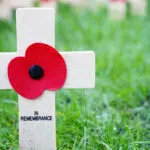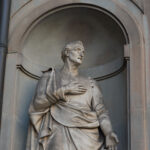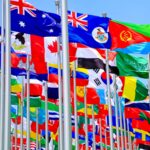Commonwealth Day is an annual moveable holiday that falls regularly on the second Monday in March, and which takes place on March 9 this year. The day is marked with a service attended by the British royal family at Westminster Abbey, and much celebration occurs globally in Commonwealth states! The historic event is a public holiday in some of its states and honors the history of the group. It promotes a peaceful global environment and hopes to inspire the Commonwealth states for their future with a yearly address by Queen Elizabeth.
History of Commonwealth Day
Though Commonwealth Day today is a well-established holiday celebrated by an estimated 2 billion people worldwide, it wasn’t always called Commonwealth Day, and it had a smaller start. It was originally known as “Empire Day,” which was established in 1902 to honor Queen Victoria. After Queen Victoria died the year before, the idea was put forth to establish a holiday that honored England, the unity between nations of the Commonwealth, and its ideals of freedom, tolerance, and justice.
Empire Day actually wasn’t officially recognized until 1916, after having been celebrated unofficially in Canada for 14 years. It took another 10 years for it to truly reach a level of popularity – in 1925, an Empire Day Thanksgiving celebration at Wembley Stadium drew around 90,000 in attendance.
In 1958, the then-Prime Minister, Harold MacMillan, rebranded Empire Day as Commonwealth Day. This is because all of the Commonwealth shares history, legal systems, culture, and more. In 1973, the Royal Commonwealth Society proposed the day be changed, and the second Monday in March was selected by the Commonwealth Secretariat as the observance day.
In today’s postcolonial world, there is much debate over the morality of the Commonwealth. While some countries still find it an important and honorable piece of history, and others even still identify the Queen of England as their monarch, more and more discourse is emerging on whether or not it is a problematic holiday. Many countries in the Commonwealth were, at one time or another, prevented from gaining independence, and some find it a reminder of brutal colonization.
Nonetheless, Commonwealth Day is still celebrated by many countries with much fervor. Several countries in the Commonwealth – though notably not Britain – celebrate Commonwealth Day as a public holiday. Parties and other festivities are held, good food is cooked, and flags are raised. Many tune in on Commonwealth Day to watch the service at Westminster Abbey, hear the Queen’s address and feel a great sense of pride in the historic alliance that is the Commonwealth.
Commonwealth Day timeline
The Commonwealth Games, which can be compared to the Olympics, are athletic competitions between the Commonwealth that occur every four years. In 2006, Queen Elizabeth II kicked off the Australian games by giving her yearly Commonwealth Address from Australia.
Prime Minister Harold MacMillan announced that Empire Day would come to be known as Commonwealth Day.
After an Empire Day Thanksgiving service held at Wembley Stadium attracted 90,000 people, the day began to really take off in popularity.
Though it had been celebrated informally since 1902, Empire Day - the precursor to Commonwealth Day - was not officially recognized as a holiday until 1916.
1902
Empire Day Honors Queen Victoria and England
To honor Queen Victoria after her passing in 1901, patriotic Empire Day was established the next year on her birthday, May 24.
Commonwealth Day FAQs
What is the purpose of Commonwealth Day?
In recent years, there has been a shift away from celebrating a single day towards celebrating a full week, with Commonwealth Day at its focus and first day. The aim is to celebrate the unity, diversity and links of the modern Commonwealth and to foster a greater understanding of the Commonwealth’s achievements and role.
What is British Commonwealth Day?
The day marks Commonwealth Day in more than 50 countries around the world. Once known as Empire Day, it is envisioned as a celebration of the cultural exchange and shared values of former Empire states. Of course, today the notion of celebrating Britain’s colonial past is a topic of some debate.
Who is the head of Commonwealth nations?
Her Majesty Queen Elizabeth II is Head of the Commonwealth. Her role is an important symbolic one.
How to Observe Commonwealth Day
Watch the Westminster Abbey service
Commonwealth Day is famously celebrated by a sermon at Westminster Abbey attended by the Queen of England. It’s televised, and followed by an address by the Queen to the various states, as she is the Head of the Commonwealth.
Learn its history
Commonwealth Day is of massive historical importance to a significant segment of the global population. However, if you’re just hearing of it, it’s worth reading up on! Check out its history as Empire Day, and understand just why so many countries are proud to be included in such an alliance.
Attend a street party or parade
There are Commonwealth festivities worldwide, so as long as it’s safe where you are, head out and find a place to celebrate! Many celebrate by eating good food, partying, and raising flags to show their pride.
5 Fun Facts About Commonwealth Day
Many are no longer in loyal to the queen
The Commonwealth of nations includes 53 countries, though only 16 still recognize the British Queen as their monarch.
It’s celebrated by a significant portion of the world
Nearly ⅓ of the globe celebrates Commonwealth Day - that’s around 2 billion people.
It’s not a public holiday everywhere
Though it honors the British Empire and all the states it contained, it’s actually not a British public holiday! However, other states of the Commonwealth, like Gibraltar, recognize it as such.
Some are now grappling with its ties to colonialism
Today, many are rethinking Britain’s history of colonialism and imperialism, and a new reality of the Commonwealth states and Commonwealth Day is increasingly being understood. There is a current push towards the moral reckoning of the holiday.
The Commonwealth has a massive GDP
The Gross Domestic Product (GDP) of the Commonwealth tops that of even the European Union (EU) - and is only expected to grow.
Why Commonwealth Day is Important
It’s an important historical day
Originally, Commonwealth Day was born from Empire Day, which honored the life and death of Queen Victoria in 1901. While this is a great piece of history, Commonwealth Day is even more historically important because it honors the historical peace within the Commonwealth, and all the common good they have achieved in partnership.
It’s a chance to display pride for the Commonwealth
Though not all the states of the Commonwealth have made Commonwealth Day a public holiday or are even still loyal to the queen, many are proud to have been included in such an alliance, and proudly display their history on this day.
It’s entertaining
Every year, billions of people celebrate Commonwealth Day with festivities and good food. On top of that, many entertainment personalities and celebrities lend a hand to speak in honor of Commonwealth Day, or even at the Commonwealth Day service. While the day is steeped in tradition and history, it’s still known to be very entertaining.
Commonwealth Day dates
| Year | Date | Day |
|---|---|---|
| 2024 | March 11 | Monday |
| 2025 | March 10 | Monday |
| 2026 | March 9 | Monday |

























